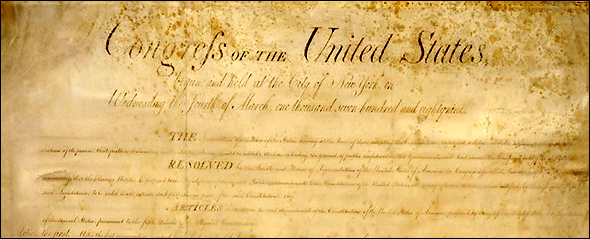Happy 230th birthday to the Bill of Rights
They were among 12 amendments first proposed by Congress to the states on 25 September 1789.
It took more than two years for three-fourths of the states to ratify ten of them.1
The Legal Genealogist recognizes — as historians must — that these were not perfect: they did not address the second-class citizenship of women; they did not address the needs or rights of the Native American population; they did not address the issue that would compel the country into civil war just 70 years later, the issue of the enslaved.
But they were a critical first step, freedom’s first guarantee in the newly-created United States of America under its newly-adopted constitution.

The final ratification needed came from Virginia, on this day 230 years ago today,2 and with that, the first ten amendments were added to the Constitution of the United States:
(Amendment 1)… Congress shall make no law respecting an establishment of religion, or prohibiting the free exercise thereof; or abridging the freedom of speech, or of the press; or the right of the people peaceably to assemble, and to petition the Government for a redress of grievances.
(Amendment 2)… A well regulated Militia, being necessary to the security of a free State, the right of the people to keep and bear Arms, shall not be infringed.
(Amendment 3)… No Soldier shall, in time of peace be quartered in any house, without the consent of the Owner, nor in time of war, but in a manner to be prescribed by law.
(Amendment 4)… The right of the people to be secure in their persons, houses, papers, and effects, against unreasonable searches and seizures, shall not be violated, and no Warrants shall issue, but upon probable cause, supported by Oath or affirmation, and particularly describing the place to be searched, and the persons or things to be seized.
(Amendment 5)… No person shall be held to answer for a capital, or otherwise infamous crime, unless on a presentment or indictment of a Grand Jury, except in cases arising in the land or naval forces, or in the Militia, when in actual service in time of War or public danger; nor shall any person be subject for the same offence to be twice put in jeopardy of life or limb; nor shall be compelled in any criminal case to be a witness against himself, nor be deprived of life, liberty, or property, without due process of law; nor shall private property be taken for public use, without just compensation.
(Amendment 6)… In all criminal prosecutions, the accused shall enjoy the right to a speedy and public trial, by an impartial jury of the State and district wherein the crime shall have been committed, which district shall have been previously ascertained by law, and to be informed of the nature and cause of the accusation; to be confronted with the witnesses against him; to have compulsory process for obtaining witnesses in his favor, and to have the Assistance of Counsel for his defence.
(Amendment 7)… In suits at common law, where the value in controversy shall exceed twenty dollars, the right of trial by jury shall be preserved, and no fact tried by a jury, shall be otherwise re-examined in any Court of the United States, than according to the rules of the common law.
(Amendment 8)… Excessive bail shall not be required, nor excessive fines imposed, nor cruel and unusual punishments inflicted.
(Amendment 9)… The enumeration in the Constitution, of certain rights, shall not be construed to deny or disparage others retained by the people.
(Amendment 10)… The powers not delegated to the United States by the Constitution, nor prohibited by it to the States, are reserved to the States respectively, or to the people.3
The Bill of Rights.
Ratified 230 years ago today.
Cite/link to this post: Judy G. Russell, “Freedom’s first guarantee,” The Legal Genealogist (https://www.legalgenealogist.com/blog : posted 15 Dec 2021).
SOURCES
- See “Bill of Rights: Primary Documents in American History,” Research Guides, Library of Congress (https://www.loc.gov/ : accessed 15 Dec 2021). ↩
- See “Ratifying the Bill of Rights . . . in 1939,” Prologue Magazine, winter 2016; U.S. National Archives (https://www.archives.gov/publications/prologue/ : accessed 15 Dec 2021). Ya gotta love the three states that got around to ratifying these on the 150th anniversary… ↩
- “Transcription of the 1789 Joint Resolution of Congress Proposing 12 Amendments to the U.S. Constitution,” America’s Founding Documents, U.S. National Archives (https://www.archives.gov/ : accessed 15 Dec 2021). Remember that only proposals 3-12 were ratified in 1791, and so were renumbered as amendments 1-10. ↩


